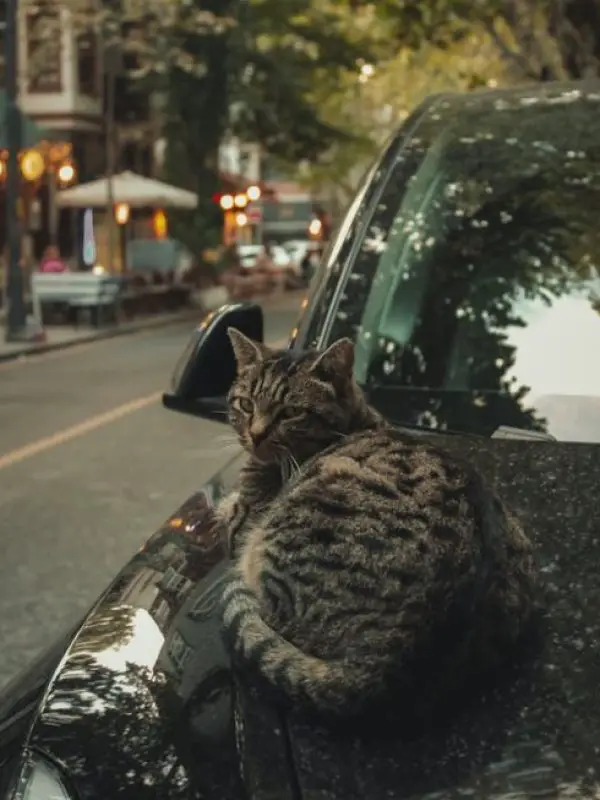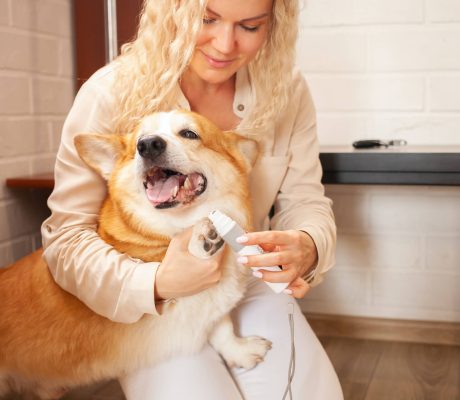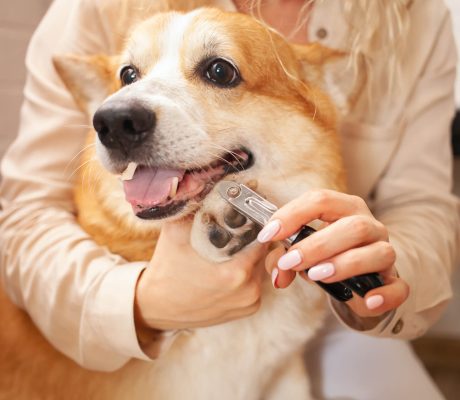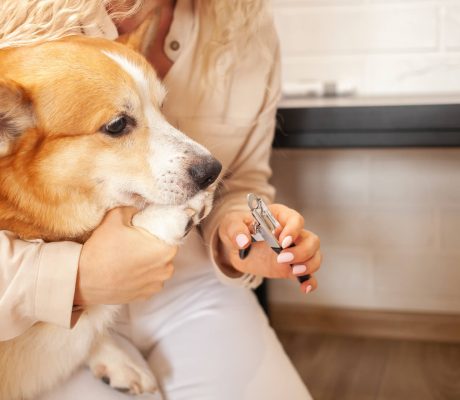To keep cats off your car, use cat repellent sprays or cover your vehicle with a car cover. Employing motion-activated sprinklers or ultrasonic deterrents can also be effective.
Dealing with feline visitors treating your car like their personal lounge can be frustrating for any car owner. Stray and neighborhood cats may find the warm hood of your car an inviting place to rest, leaving paw prints and scratches in their wake.
Car owners seek reliable methods to deter these agile creatures without causing them harm. Using repellents that cats dislike, such as citrus scents or specially formulated sprays, can make your vehicle less appealing. Physical barriers, like car covers, offer a simple yet effective solution to keep cats at bay. Additionally, strategic placement of deterrents, like ultrasonic devices or motion-activated sprinklers, provide a tech-savvy approach to the problem. These solutions can be used individually or in combination, depending on the severity of the cat intrusion and the car owner's preference.
Reasons Cats Are Attracted To Cars
Curious about why you find paw prints on your car hood? Cats love cars for many reasons. Let's explore why these furry visitors see your vehicle as their new hangout spot.
Warmth
Cars retain heat from the sun or the engine. Cats seek this warmth for comfort, especially in cooler weather. It makes a car a perfect sunbathing spot for a cat!
Shelter
Underneath or inside cars can be safe places for cats. They use these spots to hide from predators or to find peace. Cars provide the shelter cats crave.
Territorial Behavior
Cats are territorial animals. They may claim a car as part of their territory. Scent marking on tires or car hoods is common. This is a way for them to communicate with other cats.
Understanding these reasons can help in keeping cats off cars. Stay tuned for effective solutions to ensure your car stays free of cat visits!
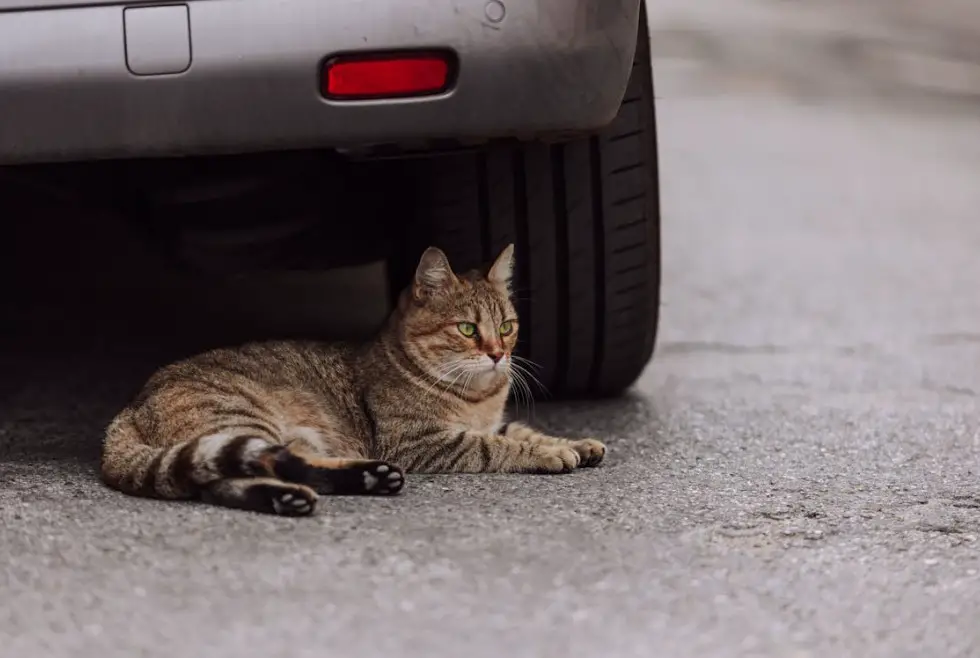
Negative Effects Of Cats On Cars
Cats climbing on cars can lead to unwanted damage. Although they may look cute,
their tiny paws can wreak havoc on your vehicle's exterior. Let's explore the ways that cats can harm cars,
and how to address these issues.
Scratches
When cats use cars as their playground, they often leave behind scratches. Their sharp claws can scrape
the paint, leading to costly repairs. Over time, these scratches can also cause rust, further damaging the car.
Dents
A cat's weight may seem insignificant, but when they jump on or off a car, they can cause dents.
Areas like the hood or the roof are particularly vulnerable. These dents are not only unsightly but can also
decrease your car's resale value.
Allergens
Allergens from cats can stick to your car's surface. This can be a problem for people with allergies.
Cat hair and dander can get into the car's interior through open windows or doors, causing allergic reactions.
To protect your car from these negative effects, consider using cat repellents or covers.
Regular maintenance like washing can also remove allergens and minimize scratches.
Non-harmful Methods To Keep Cats Off Cars
Stray cats see cars as a warm place to rest, especially on chilly nights. Yet, cat prints on the hood are not what car owners want. This post shares safe ways to keep cats off cars without harming them.
Use of Citrus Scents
Use Of Citrus Scents
Cats dislike citrus smells. They avoid lemons, oranges, and similar scents. Use this to your advantage! Place citrus peels around your car. You can also use sprays with citrus oils. This natural method keeps cats away from your car.
Aluminum Foil
Aluminum Foil
Cats hate the feeling of foil under their paws. Cover your car with aluminum foil. It's shiny and makes a noise they don't like. Cats will think twice before jumping onto your car.
- Easy to apply and remove
- Non-toxic and inexpensive
Motion-Activated Devices
Motion-activated Devices
Motion sensors can scare cats away. Devices that detect movement can activate lights or sounds. These sudden actions startle cats. They will likely avoid your car after a few scares.
- Install motion-activated sprinklers
- Set up ultrasonic deterrents
Creating Cat Deterrents
Dealing with unwanted feline visitors on your car can be a real headache. Cats love to lounge on the warm hoods of cars, leaving behind scratches and paw prints. But fear not, cat cars enthusiasts! There are effective ways to keep these furry friends at bay without harming them. Let's explore some creative cat deterrents to protect your vehicle from cats cars chaos.
Planting Cat-repellent Plants
Nature offers a gentle yet potent solution to keep cats away. Some plants emit scents that cats find unpleasant. By planting these around your car, you can create a natural deterrent. Consider these options:
- Lavender - It smells great to us but cats steer clear.
- Rosemary - This herb can keep your car free from cats.
- Citronella - Cats dislike its strong citrus scent.
Installing Physical Barriers
Physical barriers can be a strong line of defense against cat for cars issues. These methods prevent cats from accessing your car altogether. Here are some practical tools:
| Barrier Type | Description | Effectiveness |
|---|---|---|
| Car Covers | Fits over your car, keeping cats off. | High |
| Motion-Activated Sprinklers | Sprays water when it detects movement. | Medium |
| Ultrasonic Repellents | Emits sounds that cats hate but humans can't hear. | Medium |
Remember, consistency is key. Use these deterrents regularly and cats will learn to avoid your car. Protect your car and keep it looking great, free from the hassle of unexpected cat visits!
Involving Professional Help
When facing the challenge of keeping cats off your car, sometimes DIY methods are not enough. Seeking professional help can offer specialized solutions tailored to your specific situation. Professionals such as veterinarians and animal behaviorists bring expertise that ensures the safety and effectiveness of the strategies used.
Consulting A Veterinarian
Veterinarians are not just for pet health issues; they can provide valuable advice on deterring cats from your vehicles. They understand animal behavior and can suggest safe, humane deterrents that won't harm the cats or your car. Here are a few solutions they might recommend:
- Appropriate repellents: Safe for both cats and the car's exterior.
- Behavioral deterrents: Devices that startle without causing harm.
- Health checks: Ensuring no cats are using your car due to health issues.
Seeking Advice From Animal Behaviorists
Animal behaviorists specialize in understanding why animals behave the way they do. Consulting with one can provide insights into the behavior of cats around cars. They can offer strategies tailored to your local cat population. Here's what they might advise:
- Environmental modifications: Changing your car’s parking space or surroundings.
- Behavioral tools: Using tools like ultrasonic devices.
- Custom solutions: Creating plans specific to your cat-car issues.
| Professional | Services Offered | Benefits |
|---|---|---|
| Veterinarian | Health-based deterrents, safe repellents | Safe for cats and cars |
| Animal Behaviorist | Behavior modification, environmental changes | Targeted, effective solutions |
Remember, the goal is to keep cats off your car without harm. Professional guidance ensures that both cat cars and cats cars issues are handled ethically and effectively.
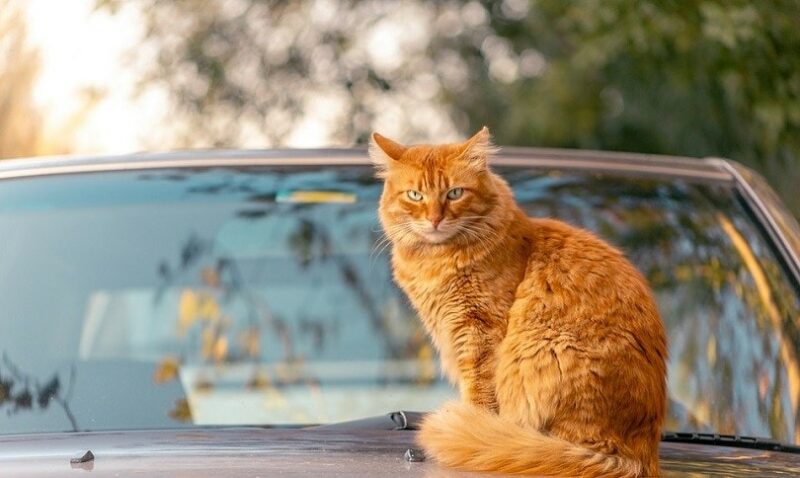
Credit: www.catster.com
Community Involvement In Cat Management
Keeping cats off cars is a common challenge for vehicle owners. Cat cars incidents can cause scratches and damage to the paintwork. Community involvement plays a crucial role in managing this issue effectively. Let's delve into how neighborhood watch programs and collaboration with animal control can help keep cats cars issues at bay.
Neighborhood Watch Programs
Neighborhood watch programs are a great way to monitor and manage the local cat for cars situation. Residents can work together to:
- Keep an eye on roaming cats.
- Share tips on keeping cats away from vehicles.
- Organize meetings to discuss concerns and solutions.
Creating a community group online can also enhance communication. Members can post real-time updates on cat sightings or share success stories about deterrent methods that work.
Collaborating With Animal Control
Working with animal control is key to managing cats in the neighborhood. Here are steps to ensure effective collaboration:
- Contact local animal control to report frequent sightings.
- Request guidance on humane deterrents.
- Participate in trap-neuter-return (TNR) programs.
- Discuss setting up a schedule for animal control patrols.
Animal control can provide valuable resources, such as advice on legal deterrents or assistance with stray cats. They ensure community efforts align with local animal welfare laws.
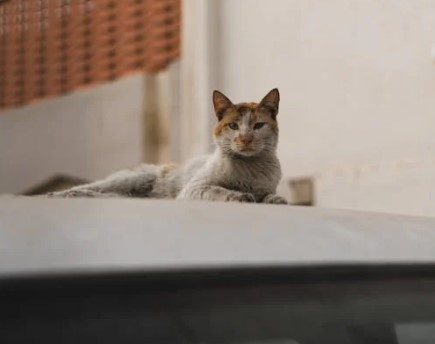
Frequently Asked Questions
What Can I Use To Keep Cats Off My Car?
To keep cats off your car, use cat repellent sprays, ultrasonic deterrents, or cover your vehicle. Consider placing mothballs or citrus peels around the car.
What Smell Will Repel Cats?
Cats are repelled by certain smells, including citrus scents, lavender, peppermint, and eucalyptus. Using these scents around areas you want to protect can help keep cats away.
How To Stop Cats Climbing Into Car Engine?
To stop cats from climbing into a car engine, tap the hood before starting the car, use cat repellent sprays, and park in secure areas. Keep the engine compartment unattractive by using deterrents like cayenne pepper around the vehicle.
How Do I Stop Cats From Spraying My Car?
Use cat repellent sprays or ultrasonic deterrents around your car. Regularly cover your vehicle with a car cover.
What Smells Deter Cats From Cars?
Cats dislike a variety of smells, including citrus scents, cayenne pepper, and vinegar. Applying these around your car can keep them at bay.
Conclusion
Keeping cats off your car can be simpler than you think. Use the strategies mentioned, like repellents and car covers. Experiment to find what works best for your situation. Remember, consistency is key. With the right approach, your car can remain free from curious cats, looking as good as new.


